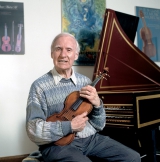Awards
- Distinguished Professor (Emeritus) - 2016

Stanley Ritchie, born and educated in Australia, graduated from Sydney Conservatorium of Music as a pupil of Florentine Hoogstoel in 1956. In 1957, while studying with Ernest Llewellyn, he was appointed concertmaster of the inaugural Australian Youth Orchestra, and later that year was Commonwealth winner of the Australian Broadcasting Commission's Concerto and Vocal Competition. As a boursier of the French government he pursued his musical education in Paris as a pupil of Jean Fournier, continuing to the United States in 1959, where he studied with Joseph Fuchs at Yale, was graduate assistant to Robert Koff at Brandeis University, and, after a year in the New School in Philadelphia, moved to New York, where his teachers were Oscar Shumsky and Samuel Kissel. While living in New York he served as concertmaster of New York City Opera, associate concertmaster of the Metropolitan Opera and concertmaster of the Musica Aeterna Orchestra, and was a member of the New York Chamber Soloists. Leaving New York in 1973 he played as assistant concertmaster of the Vancouver Symphony Orchestra, first violinist of the Philadelphia String Quartet and co-leader of the Sydney String Quartet before returning to the United States in 1982 to take up his appointment as Professor of Violin in the IU Jacobs School of Music.
"No one has been more influential in the field of Early Music than Stanley Ritchie." "One of the premier Baroque violinists working today anywhere in the world," Professor Ritchie is a "pioneer" and "one of the world's most eminent period violinists." Ritchie is an expert in historical performance-a field that offers scholars, performers and audiences the chance to gain progressively clearer impressions of cultural roots through music by situating performances of early music in their historical context using period instruments. Professor Ritchie has been "on the cutting edge" of rediscovering these performance methods. His work "has shaped the complexion of this country's major period performing ensembles. The rosters of the best-known ensembles at work today feature Stanley's students."
His interest in Baroque and Classical violin dates from 1970 when he began collaborating with Juilliard harpsichordist Albert Fuller, which led to the founding of the celebrated Aston Magna workshop and summer festival. He later joined forces with Elisabeth Wright, a harpsichordist, as Duo Geminiani, performing in Great Britain, Ireland, Belgium, Holland, Denmark, Norway, Germany, Italy, Colombia, and Australia. Their Wigmore Hall debut in 1976 received critical praise, as did their 1983 recording of Bach's Sonatas for Violin and Obbligato Harpsichord.
Recognized as one of the world's leading exponents of Baroque and Classical violin playing, in addition to performing, he has taught and lectured in Australia, Germany, Italy, Colombia, China and Greece. He served as Artistic Director of the Bloomington Early Music Festival, and has been a faculty member of the Accademia di Musica Antica in Bruneck (Südtirol) since 2000. In 2009 he received Early Music America's highest award, the Howard Mayer Brown Award for Lifetime Achievement in Early Music. "His has been for decades by far the most important baroque violin class in North America, turning out succeeding generations of highly competent and successful young musicians, whose undying love and affection for him is an accolade in itself."